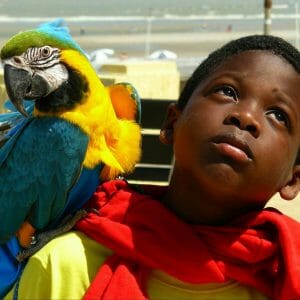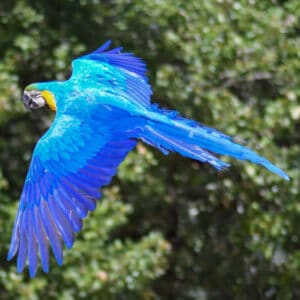Last Updated on by Mitch Rezman
My severe macaw is losing all its feathers.
The vet says I should switch her to 80% pellet food.
However, I am not convinced. I don’t think they eat pellets in the wild.
I am trying adding HARI Prime vitamin, mineral, and amino acid supplement w/probiotics to her diet.
Do you think this is an acceptable alternative?
Of course, she gets sprouts, veggies grains, etc.
Also, should I get her a Full Spectrum Light since this time of year we get shorter hours of light?
One more thing, do you feel that I could put Colloidal Silver in her water and mist her as well(w/Colloidal Silver)?
My vet looked at me like I was some kind of nut. I would appreciate any input.
Thank you.
Lesley
Hi Lesley
re: My severe macaw is losing all his feathers.
All birds lose all their feathers and replace them on a regular basis – it’s called the molt.
Is it plucking, molting or over-preening? Why are those feathers on the cage floor?
Your vet doesn’t seem to be concerned that your bird has any disease.
What confuses me is that he simply says change to a “pellet” diet.
Now I agree with you that there are no pellet trees in the rainforest and you are certainly on the right track with a vitamin supplement but you neglect to state what the underlying food your severe macaw gets.
How many macaw species are there anyway? You’d be surprised.
The problem with switching to a pellet diet is determining which one would have the greatest efficacy because pellet formulations by manufacturers are all different.
Have you investigated food allergies?
Perhaps we should look at a rice-based pellet diet, or any pet bird diet without soy.
I would start with Alternative formula pellets by HARI (Hagen) which is soy free and has been getting rave reviews from avian veterinarians.
re: Of course, she gets sprouts, veggies, grains, etc
Which is all fine and dandy but the bigger question is I’m still not seeing where she is getting protein.
Protein forms amino acids which are what make up feathers.
Is she getting enough protein in her diet?
How do we know she’s a she?
re: Also, should I get her a Full Spectrum Light since this time of year we get shorter hours of light?
All captive birds should have full-spectrum lighting no higher than 6 inches over their cages on a timer set to provide 12 hours of light and 12 hours of darkness with no respect for daylight savings time. All year round!
This helps synchronize any bird’s circadian rhythm helping keep them less stressed or stress-free which could be a trigger for feather loss.
re: One more thing, do you feel that I could put Colloidal Silver in her water and mist her as well(w/Colloidal Silver)?
I get this question and similar ones like using CBD oil for pet birds.
I don’t believe in going “off script” with any supplement especially for a bird because of the uber-sensitivity of anything entering their body due to an off-the-charts metabolism compared to humans.
If Mark Hagen, the developer Hagen bird foods or Ed Schmidt from Goldenfeast or Mr Ignacio Perea, Sr. the founder of Higgins bird food felt colloidal silver would benefit captive birds, colloidal silver would be in most pet bird foods today.
These men along with easily another dozen commercial bird food company CEOs have spent millions of dollars on research for the best commercial pet bird foods possible.
I’ve personally conversed with many of them including Dr. Ted Lafeber.
Most of the bird foods these humans have developed will satisfy 100% of the nutritional requirements needed for your bird
Did the veterinarian run a blood panel for your bird?
Is it deficient in any vitamins?
That’s where we need to start.
I await your reply
Best MitchR
My vet reports her blood work is good.
I had the DNA sex test done and he is a she.
The Vet does not recommend Full Spectrum light and has told me she does not recommend sprouting as it can cause a bacterial infection.
I am at a loss as to what to do next.
I thought Hagen Prime supplement might help but my bird apparently disagrees – he(or she as I have now learned) will not touch it.
NOTE: Use half the strength of any new vitamin or supplement for a few weeks until the bird gets used to it, then you can increase the dose to the recommended amount.
What proteins should I be giving my bird for the best results?
The Vet has recommended the next test should be for circovirus.
Money is an issue and I need to figure out what is the best route to take.
That test alone is $164 Canadian.
Trying my best but don’t know what to do.
I don’t understand why light or supplements won’t help. Any suggestions will be appreciated.
MitchR responded
Veterinarians don’t recommend light therapy for birds because they are unable to monetize it.
We use lighting to stop chronic egg layers.
I can’t get one veterinarian to take a look because they get upwards of $300 for a shot of Lupron (what one of our customers was recently charged for a single injection).
Their answer will always be “Let’s do some more testing for $$$”.
Start with Full-Spectrum light therapy. It can’t hurt.
Give it 2 weeks, let’s see what happens.
Editor’s note: full-spectrum lighting is recommended by…
- Ontario Veterinary College, University in Guelph, Ontario.
- Hagen Avicultural Research Institute
- Dr. Gregory Harrison (of Harrison’s Bird Foods)
If sprouts cause bacterial infections but your bird is eating them with no infections. Fresh home-grown sprouts used daily are very healthy.
Did you ask for a brand-specific pellet recommendation?
Did you know Lafebers offers certain lines of their foods only available through veterinarians?
Was this discussed?
“It’s not about UVA and UVB – it’s about light cycles”
Check out our no-frills full spectrum bulb solving bird behavior problems worldwide.
So far your veterinarian has diagnosed a specific issue nor fixed anything – what have you got to lose?
BTW when we hear circovirus we think dog – In birds, it’s called Psittacine beak and feather disease (PBFD).
I would advocate seeing an avian vet.
Best MitchR
One of the ironies here is the recommendation to use Harrison’s pellets.
Although your vet doesn’t believe in “full spectrum lighting” which is another name for sunlight – Gregory Harrison, DVM and the avian veterinarian that INVENTED Harrison’s believes in full spectrum lighting.
That said.
Harrison’s bird food pellets have soy have you eliminated Soy? Soy can be a plucking trigger.
Our friends from HARI (Hagen Avicultural Research Insitute) believe in full spectrum lighting so do their friends at this veterinary college
Have you checked your avian vets credentials here?
New story about living with a parrot.
Trying to negotiate permission to hang a new toy
Hi Greg
1) Stand on a chair in front of Dudley (so you are higher than him) and flap your arms slowly indicating to Dudley YOU are THE alpha male in the house
2) Start clicker training 5 minutes a day
3) Remove Dudley from the birdcage and take everything out of the cage.
Next, rearrange everything adding the new toy.
Do this every week or two for a month and then monthly to keep him “humble”.
Let us know how it goes
Best MitchR
MitchR answers another question about macaw parrots
Hi.
I just read your reply to the person asking for a talking parrot for his children.
Excellent response.
My question however is about my handicapped blue and gold macaw, Amnesia.
She is missing two toes on one foot.
She’s about 30 years old.
My ex-husband acquired her that way.
When we divorced after 3 years I kept Amnesia because he was not a good person.
I’ve provided her with several flat “perches” she can rest on in addition to conventional perches but I wonder if there is someone that specializes in adapting environments for handicapped birds.
She otherwise is healthy and sees an avian vet 2x a year for checkups and nail trims.
She has a walk-in cage (huge) for when I’m at work and is pretty happy.
As she gets older I’m sure she’ll need more help.
Even now I see that her foot aches at times.
Thank you for reading my question. Virginia. Connecticut.
MitchR replied
Hey Virginia,
Sounds as though you’ve got the situation nailed down.
Please consider flat boards like 2x4s and 2x6s in that big walk-in cage.
Is she flighted?
Clipped wings distort balance, full wings help with balance taking some load off the feet – FYI
Best
MitchR
Author Profile
Latest entries
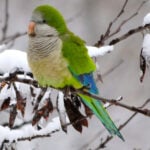 The Traveling BirdJune 26, 2025Can You Name 5 Parrot Species That Are Living Wild in the USA?
The Traveling BirdJune 26, 2025Can You Name 5 Parrot Species That Are Living Wild in the USA?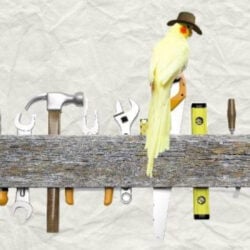 Bird BehaviorJune 26, 2025How is it Parrots Are Problem Solvers Social Animals and Even Use Tools?
Bird BehaviorJune 26, 2025How is it Parrots Are Problem Solvers Social Animals and Even Use Tools?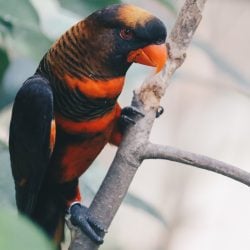 Bird & Parrot AnatomyJune 25, 2025How a Tiny Chemical Modification Makes Parrots Nature’s Living Paintings
Bird & Parrot AnatomyJune 25, 2025How a Tiny Chemical Modification Makes Parrots Nature’s Living Paintings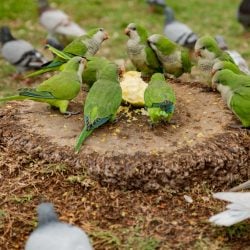 PigeonsJune 20, 2025How Do Parrots Thrive in Cities Outside Their Native Habitats?
PigeonsJune 20, 2025How Do Parrots Thrive in Cities Outside Their Native Habitats?


